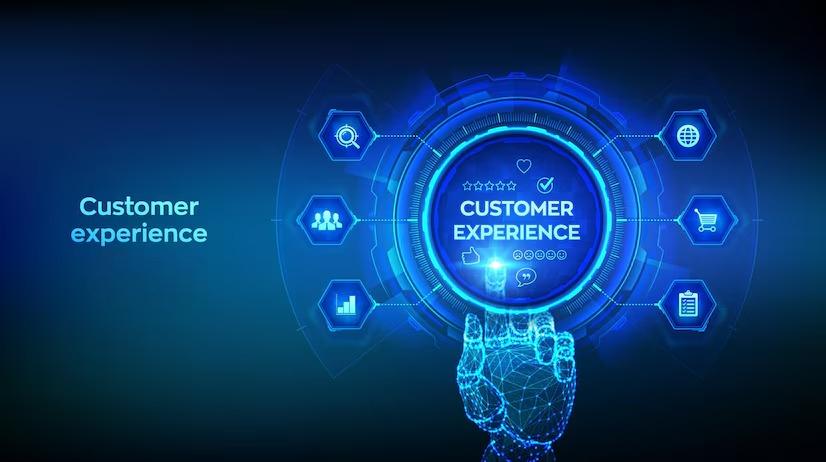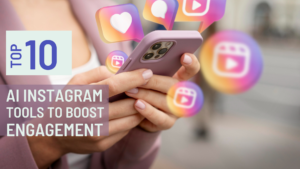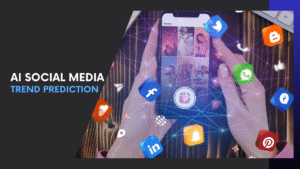The rapid advancement of artificial intelligence (AI) is revolutionizing the way brands engage with their customers. From personalized interactions to predictive analytics, AI-powered brand engagement is reshaping the future of social interactions and setting new standards for customer experience. By leveraging artificial intelligence, brands can enhance their social media strategies, foster deeper connections, and stay ahead in an increasingly competitive market.
This article explores into the transformative role of AI in enhancing customer relationships, fostering brand loyalty, and redefining social media dynamics.
What is AI-Powered Brand Engagement?
AI-powered brand engagement refers to the use of artificial intelligence technologies to create personalized, efficient, and meaningful interactions between brands and their target audiences. By leveraging AI, businesses can analyze customer behavior, predict preferences, and deliver tailored experiences that resonate with individual consumers. This advanced level of engagement is critical in a world where customers expect brands to anticipate their needs and provide real-time solutions.
Key Components of AI-Powered Brand Engagement:
- Chatbots and Virtual Assistants: AI-driven tools that provide instant customer support.
- Predictive Analytics: Forecasting customer behavior to optimize marketing strategies.
- Sentiment Analysis: Understanding customer emotions through social media interactions.
- Personalization Engines: Delivering content tailored to individual preferences.
- Automation: Streamlining repetitive tasks to enhance operational efficiency.

The Future of Social Interactions
AI is poised to redefine how brands and consumers interact on social platforms. The future of social interactions lies in the seamless integration of AI technologies that enhance user experiences and foster deeper connections.
Key Trends Shaping the Future of Social Interactions:
- Hyper-Personalization AI algorithms analyze vast amounts of data to create highly personalized content. This level of customization ensures that every interaction feels unique and relevant, significantly improving customer satisfaction and loyalty.
- Voice and Conversational AI Voice-based interactions, powered by AI, are gaining traction. Tools like Alexa, Google Assistant, and Siri are becoming integral in how consumers engage with brands, paving the way for conversational AI to dominate social interactions.
- AR and VR Integration Augmented Reality (AR) and Virtual Reality (VR) experiences, enhanced by AI, allow brands to create immersive social interactions. This technology enables virtual try-ons, interactive demos, and engaging storytelling.
- AI-Driven Content Creation From generating social media posts to crafting detailed articles, AI-driven content creation tools help brands maintain a consistent and engaging online presence. Tools like ChatGPT, Writesonic, and Jasper are leading this evolution.
- Real-Time Customer Insights AI tools provide real-time insights into customer behavior, enabling brands to adapt their strategies swiftly and stay ahead of trends.
Transforming Brand Loyalty with AI
Building brand loyalty in the digital era requires more than just quality products or services. It hinges on creating meaningful and memorable interactions that foster trust and emotional connection. AI plays a pivotal role in this transformation by:
- Enhancing Customer Support: AI chatbots provide instant and accurate responses, ensuring customers feel valued and supported.
- Rewarding Loyalty Programs: AI analyzes purchase history and engagement patterns to offer personalized rewards and incentives.
- Proactive Engagement: AI anticipates customer needs, sending timely recommendations and reminders.
- Strengthening Emotional Connections: Sentiment analysis allows brands to gauge customer emotions and respond empathetically.
Case Studies:
- Starbucks: Starbucks leverages AI to enhance its loyalty program and deliver a highly personalized customer experience. Using data from individual purchase histories, the company provides tailored recommendations, such as suggesting favorite drinks or introducing new menu items that align with a customer’s preferences. Additionally, Starbucks uses AI to optimize inventory management, ensuring popular items are always available, further improving customer satisfaction and engagement.
- Netflix: Netflix has set the gold standard for personalized customer engagement by using AI algorithms to recommend shows and movies tailored to individual preferences. Its AI analyzes user behavior, viewing history, and ratings to create a highly customized experience. This personalized approach has significantly increased viewer retention and engagement, demonstrating the power of AI in keeping audiences hooked.
- Nike: Nike employs AI to offer a personalized shopping experience through its mobile app and website. The Nike Fit tool uses AI and augmented reality to measure customers’ feet and recommend the perfect shoe size. Moreover, its AI-powered chatbot assists customers in finding products and answering queries, ensuring a seamless and interactive shopping journey.
- Coca-Cola: Coca-Cola uses AI to enhance its marketing strategies and product development. By analyzing social media conversations, Coca-Cola identifies emerging consumer preferences and trends, enabling the company to launch targeted campaigns and create new flavors. For example, the AI-driven campaign for “Share a Coke” used data to personalize bottle labels with popular names, resulting in a significant boost in sales and brand engagement.
- Domino’s Pizza: Domino’s has embraced AI to streamline its customer experience through its “Domino’s AnyWare” platform. This tool allows customers to order pizza through voice assistants, smart TVs, or even text messages with the help of AI chatbots. Additionally, Domino’s uses AI-powered predictive tools to ensure fast delivery by optimizing routes and predicting order preparation times.
- Amazon: Amazon relies heavily on AI to power its recommendation engine, which accounts for a significant portion of its sales. By analyzing browsing history, purchase behavior, and even abandoned cart data, Amazon provides highly personalized product suggestions. Its AI also supports customer service through Alexa, offering voice-activated assistance and improving the overall shopping experience.

AI in Customer Experience
Customer experience (CX) is a crucial differentiator for brands, and AI is revolutionizing how businesses interact with their customers at every touchpoint. By automating processes, providing real-time solutions, and personalizing interactions, AI ensures a seamless and enjoyable customer journey.
Key Benefits of AI in Customer Experience:
- 24/7 Availability AI-powered chatbots provide round-the-clock support, ensuring customers can get assistance whenever they need it.
- Faster Response Times AI tools reduce response times, addressing customer queries and concerns instantly.
- Improved Accuracy Machine learning algorithms analyze data to provide precise solutions, minimizing errors in customer interactions.
- Enhanced Accessibility AI tools like voice recognition and text-to-speech make interactions more accessible, catering to diverse customer needs.
- Dynamic Feedback Loops AI collects and analyzes customer feedback in real time, allowing brands to make data-driven improvements to their services.
AI-Driven Social Media Connections
Social media platforms are becoming increasingly sophisticated, thanks to AI. From content curation to audience targeting, AI-driven social media connections enable brands to build stronger relationships with their followers and drive engagement.
AI Applications in Social Media:
- Content Recommendations AI algorithms suggest relevant content to users, ensuring they stay engaged with a brand’s offerings.
- Audience Segmentation By analyzing user data, AI helps brands identify and target specific audience segments with tailored messages.
- Influencer Collaboration AI tools identify the best influencers for a brand based on audience alignment and engagement metrics.
- Automated Posting and Scheduling Tools like Buffer and Hootsuite leverage AI to optimize posting schedules for maximum reach and engagement.
- Social Listening and Sentiment Analysis AI-powered social listening tools monitor brand mentions and analyze sentiment, helping businesses understand public perception and address issues proactively.
Notable Tools for AI-Powered Brand Engagement:
- Hootsuite Insights
Powered by Brandwatch, Hootsuite Insights helps brands dive deep into social conversations. It provides real-time data on customer sentiment, enabling businesses to track the performance of their campaigns and tailor future strategies for maximum impact. - Sprinklr
Sprinklr offers a unified customer experience platform that integrates social listening, analytics, and engagement. Its AI capabilities allow brands to understand customer emotions, predict trends, and deliver personalized content across various channels, ensuring a seamless experience for their audience. - Brandwatch
A leader in social media analytics, Brandwatch uses AI to provide detailed insights into online conversations. It helps brands identify key influencers, monitor brand health, and understand audience preferences, making it a valuable tool for shaping effective engagement strategies. - Socialbakers
Socialbakers leverages AI to deliver comprehensive social media analytics and audience insights. The platform enables brands to optimize their content strategies, measure campaign performance, and benchmark against competitors. It also offers tools for identifying the best times to post and the type of content that drives the most engagement.
By incorporating these AI-driven tools, businesses can transform their approach to social media, shifting from generic posts to highly targeted, data-driven interactions. This not only boosts engagement but also builds trust and loyalty among customers, paving the way for long-term success in the digital age.
Challenges and Ethical Considerations
While AI offers numerous benefits, its implementation in brand engagement is not without challenges and ethical dilemmas.
Challenges:
- Data Privacy and Security The use of AI requires extensive data collection, raising concerns about customer privacy and data breaches.
- Bias in Algorithms AI algorithms may inadvertently perpetuate biases present in the data, leading to unfair or discriminatory practices.
- Over-Automation Over-reliance on AI can lead to a lack of human touch, potentially alienating customers who prefer personal interactions.
Ethical Considerations:
- Transparency Brands must be transparent about their use of AI, ensuring customers understand how their data is being used.
- Consent Obtaining explicit consent from customers before collecting and using their data is essential.
- Accountability Companies must take responsibility for the decisions made by AI systems, especially in sensitive scenarios.

The Road Ahead: Emerging Trends in AI-Powered Brand Engagement
The future of AI-powered brand engagement is brimming with possibilities. As technology continues to evolve, brands must stay abreast of emerging trends to remain competitive.
Upcoming Innovations:
- Emotion AI Advanced AI systems capable of detecting and responding to human emotions will revolutionize customer interactions.
- AI-Powered Storytelling Brands will leverage AI to create compelling narratives that resonate with their audiences on a deeper level.
- Blockchain Integration Combining AI with blockchain technology will enhance data security and transparency in brand-customer interactions.
- AI-Driven Gamification Incorporating gamification elements into brand engagement strategies will make interactions more interactive and enjoyable.
- Sustainability-Focused AI AI tools will help brands adopt more sustainable practices by optimizing resource usage and reducing waste.
Conclusion
AI-powered brand engagement is no longer a futuristic concept; it’s a present-day reality shaping the future of social interactions. By leveraging AI technologies, businesses can build stronger connections, enhance customer experiences, and foster long-term loyalty. However, to fully realize the potential of AI, brands must address challenges, adhere to ethical standards, and stay attuned to emerging trends. The journey toward AI-driven engagement is just beginning, and the opportunities it presents are boundless.



Pingback: 10 Mind-Blowing AI Tools for Social Media Insights You’re Not Using Yet! - AI Content Minds